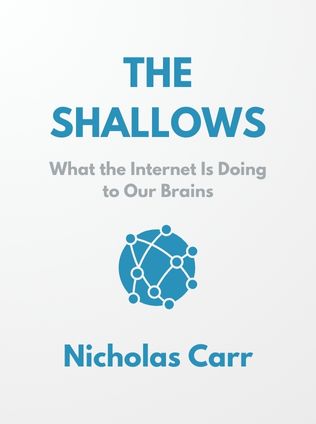
The Shallows
What the Internet Is Doing to Our Brains
By Nicholas Carr
Published 06/2010
About the Author
Nicholas Carr is a distinguished journalist and author, best known for his work on technology, business, and culture. He has written extensively about the profound changes that digital technology brings to society, particularly focusing on its cognitive and cultural impacts. Before writing "The Shallows," Carr authored several influential books, including "Does IT Matter?" and "The Big Switch," both of which explore the economic and social consequences of the expanding digital universe. "The Shallows," published in 2010, was a finalist for the Pulitzer Prize in General Nonfiction and has been highly regarded for its incisive examination of the internet's effects on our minds and lives.
Main Idea
In "The Shallows," Nicholas Carr offers a compelling exploration of how the internet is not only transforming the way we access information but also fundamentally altering the way we think, remember, and interact with the world. Carr argues that our increasing dependence on digital technology is leading to a significant shift in our cognitive processes, where deep, contemplative thinking is being replaced by rapid, shallow engagement with information. He warns that this change is not just a matter of personal habit but is reshaping our brains and, consequently, our society.
Table of Contents
- Introduction
- The Tools of the Mind
- The Vital Paths
- The Deepening Page
- A Medium of the Most General Nature
- The Juggler's Brain
- The Church of Google
- The Shallows
- The Great Wall of Distraction
- A Thing Like Me
- Conclusion: The Shallows
The Tools of the Mind
In the opening chapters, Carr delves into the history of tools that have shaped human cognition. He explores how every significant technological innovation, from the map to the clock, has redefined how humans perceive and process information. Carr explains that these tools don't just provide new ways of interacting with the world but actually rewire our brains to accommodate new ways of thinking. For instance, he describes how the invention of the clock altered human perception of time, segmenting it into measurable units that shifted people’s daily lives away from nature's rhythms and toward more structured, quantifiable schedules.
As Carr notes, "Every new medium, from the written word to the internet, reshapes how we perceive the world and how we process the information we gather" (Carr, "The Shallows"). This observation sets the stage for his argument that the internet, as a tool of unprecedented reach and influence, is reshaping our minds in ways that are both profound and troubling.
Sign up for FREE and get access to 1,400+ books summaries.
You May Also Like
The Subtle Art of Not Giving a F*ck
A Counterintuitive Approach to Living a Good Life
By Mark MansonHow To Win Friends and Influence People
The All-Time Classic Manual Of People Skills
By Dale CarnegieFreakonomics
A Rogue Economist Explores the Hidden Side of Everything
By Steven D. Levitt and Stephen J. DubnerQuiet: The Power of Introverts
The Power of Introverts in a World That Can't Stop Talking
By Susan Cain



















